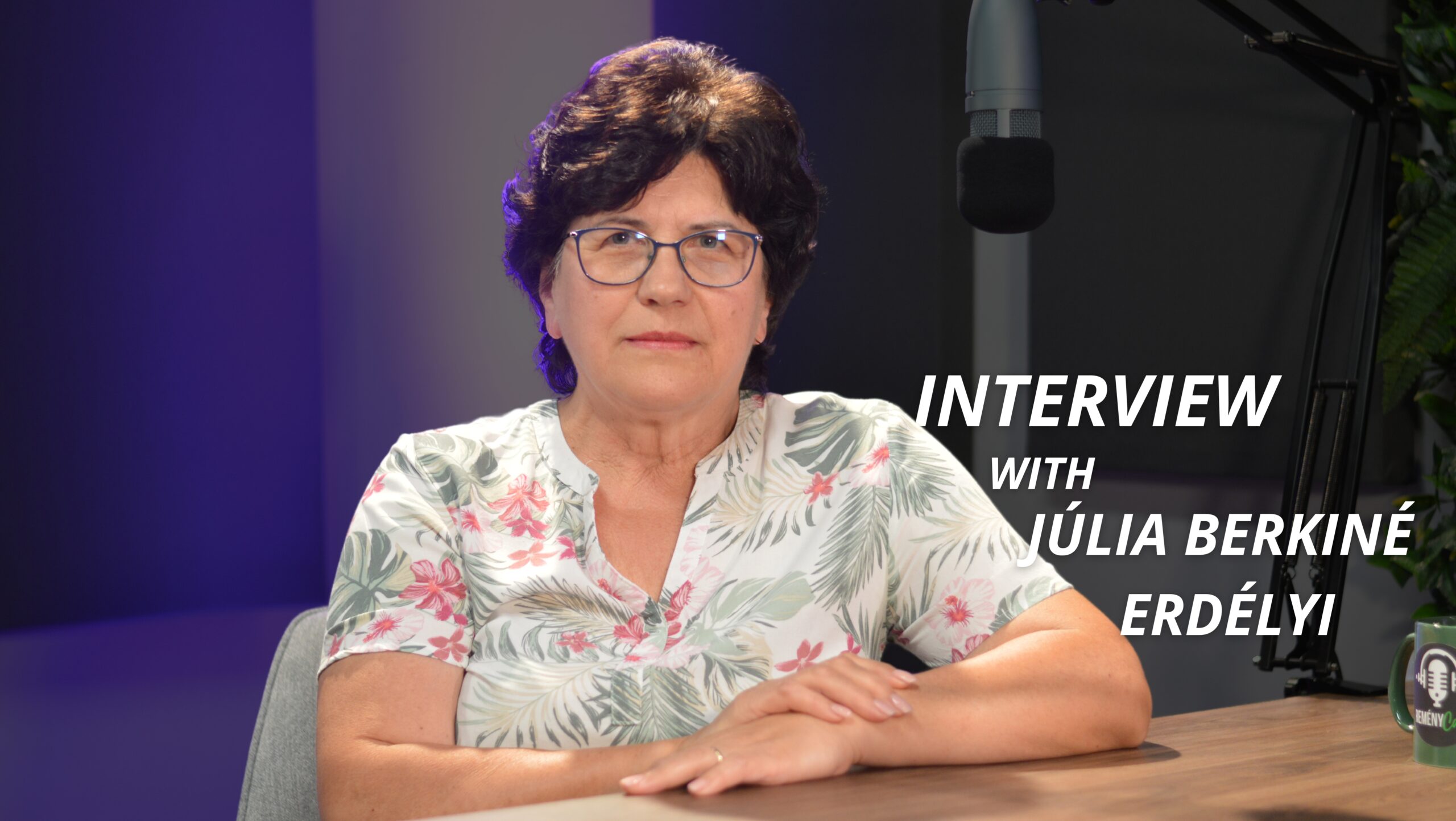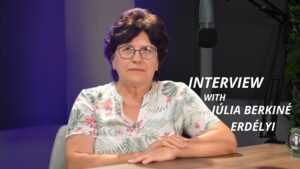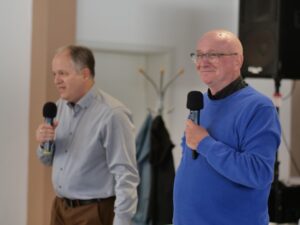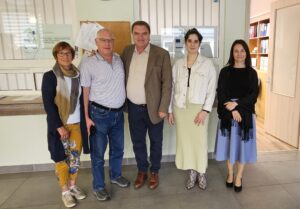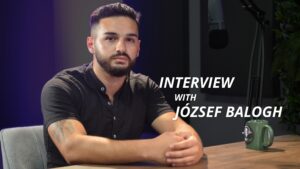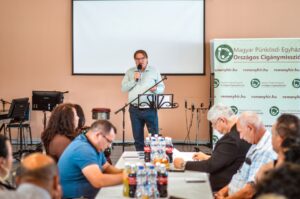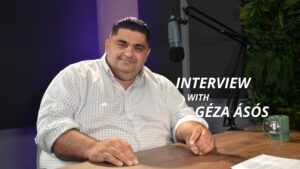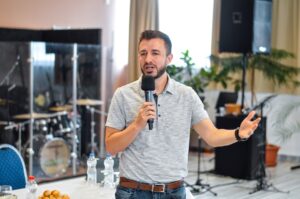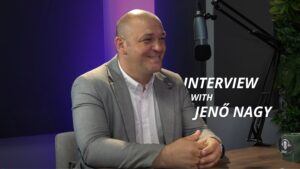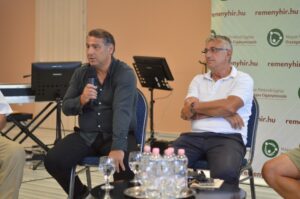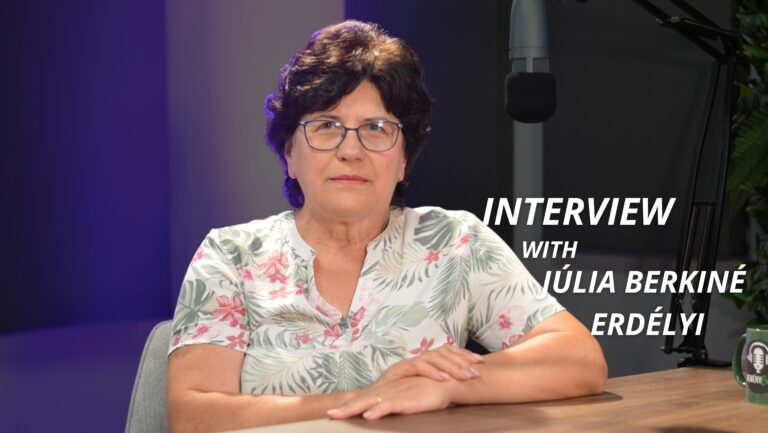In today’s interview, we are talking with Júlia Berkiné Erdélyi, who has a close relationship with the Hungarian Gypsy Missions International. For several decades, she has served the marginalized segments of society, with a special focus on serving Roma women. Why did she choose this path? How does she live her life as a pastor’s wife? Has she become what God envisioned her to be? And has she found her hope?
Thank you so much for being here in the Reménycast studio, and it is a special joy that you arrived together with your husband from Verpelét. Your husband serves as a pastor, and both of you maintain a close relationship with the mission. How long have you been doing this ministry, and how did you find this path?
I began this ministry 33 years ago, during the 1990 political changes. That’s when the Roma mission started, and although we hadn’t consciously prepared for it, I believe the Lord had already prepared us for this task, and we simply found ourselves involved.
It wasn’t easy to get here, and I understand that the Christian world is not unfamiliar to you, as it has been present in your life since childhood.
Yes, that’s true. My grandparents were the first to convert; they became Bible-believing Christians, and later my parents also converted, becoming born-again Christians. We were raised in this spirit, so I have been attending church since I was a baby. This value system fundamentally shaped my life, and it seemed natural that I would continue on this path as an adult. However, it wasn’t enough that my parents set a good example or the upbringing I received. I, too, had to reach a personal decision to choose God for myself.
Did you ever have doubts about choosing this path?
Yes, as a teenager, I had many doubts. I read books that were anti-God and even occult literature, which raised questions for me. But the events of my life eventually led me to recognize that God is the only way. He is alive, He loves me, and He has a plan for me.
Do you always manage to live according to Christian values?
Since I’ve been saved, God has lived within me, and the characteristics of Jesus are starting to show in me. It’s a continual process throughout my life. In difficult situations or when making decisions, I don’t just rely on my own understanding but on God’s guidance. Without Him in me, it would be much harder because the rules can seem strict. But I believe God’s boundaries are there because beyond them lies danger, and when I’m under His guidance, I always experience the good fruits of it.
You say the Lord is within you? How do you know this?
Firstly, I have often felt His calling. It’s not just a feeling but a deep inner awareness and experience that proves God is truly present. Secondly, I consciously asked Him to come into my life, to be my guide and Savior. You only say that if you truly believe it will happen. And I’ve experienced that it is indeed true, and this experience continues to grow in me, for which I am very grateful.
You surely speak to people who are not yet Christians but want to become one. What do you tell them?
In such cases, I share my own example, but I’ve also gained much experience from others’ lives over 33 years of ministry. I now understand the Bible more deeply and see how it works in practical life. While I’m not perfect, what I receive from God’s presence and the Word, I can pass on as wisdom. I don’t have to experience everything myself, as the experiences of others are also instructive. The Bible is always the most important source, as it gives many practical pieces of advice that work in life and help.
Have you ever felt that God is calling people through you?
Yes, that has become the purpose of my life. As a teenager growing up in a Baptist church, several teachings by ministers deeply touched me, and I felt that God was calling me to serve. He didn’t just want to change my life but others’ lives through me as well. My calling became helping others come to know Jesus Christ, the Savior. Later, it became clear that I needed to focus my ministry especially on Roma people.
How did the process begin where you turned towards Roma people?
I didn’t have much connection with Roma people. In the town where I lived, there were no Roma residents. During a break after high school graduation, I was selling books at the Dobó Square, where a book fair was taking place. I saw a mother with her Roma son approaching the book tent, and they sat down on a flowerbed. At first, she just observed the books from a distance. That’s when I first felt an unusual love and compassion filling my heart. I went over, sat on the edge of the flowerbed, and started showing them the pictures in the book. It was a fantastic, cathartic experience that I still remember. A few minutes later, the father arrived, and he seemed to be under the influence of alcohol because his behavior and tone suggested that. His anger was directed towards his wife and child, and at that moment, I had a different kind of realization. I realized that these people need help to escape their difficult situation and live a better quality of life.
I feel that this was the beginning of my love for Roma people, although at the time, I didn’t know what purpose I had to experience it for.
How did you come into contact with the Hungarian Gypsy Missions International, and what tasks did you undertake within the support ministry?
I came into contact with the HGMI when Albert, the president, visited us at home and shared his plans for establishing a social service. His speech was very motivating for me, and I felt that this was an opportunity through which I could help others. Within the home care service, I not only provided physical help in caring for the elderly but also offered spiritual support. These two activities went hand in hand while I also actively participated in the ministry in local churches alongside my husband.
As a pastor’s wife, what experiences do you gain, and how do you live out this special gift?
It’s indeed a special thing that I experience as a gift. I would never have thought on my own that I would be capable of participating in such a ministry, but there was always a desire in me. God has guided my life, and it’s evident that my husband didn’t believe he would become a pastor either, as he used to barely dare to speak in front of a few people. Now he preaches, which is a wonderful development. For me, this means that God is capable of anything and that if He calls us, He also gives us the strength and courage needed.
What traditions and values characterize Roma communities regarding early marriages?
In Roma communities, early marriage is common, with people often marrying at the age of 16. Great emphasis is placed on the girl being a virgin before marriage, as purity is an important value in the community. Among the Oláh Roma, it’s sometimes the family that chooses the partner, while among Hungarian Roma, emotions and romantic relationships are more decisive. Traditionally, marriage is not always formally sealed by a registrar; it’s enough if a community authority, such as the Roma leader, marries the couple.
How enduring are Roma marriages, and what role do women play in the family?
In Roma communities, many marriages are long-lasting, and women often have their husband as their first and only sexual partner. The expectation of purity is deeply rooted in tradition, and the community highly values this. Among the Oláh Roma, paternal authority dominates, and the father’s word is decisive in decisions. Among Hungarian Roma, a more egalitarian approach is increasingly observed, where men and women make decisions together. In many cases, women are the primary breadwinners, especially if the husband is unable to fulfill this role due to issues such as alcohol or drug problems. Roma women are very strong and do everything for their children, but this often leads to mental strain and exhaustion.
How do you support Roma women and congregations, and what tasks do you carry out in your ministry?
In Heves County, small congregations and home groups have formed in 14 villages, where the gospel has been spread by word of mouth since the 1990s. Our colleagues and I tell people that there is a possibility of living a different kind of life, through the love of Jesus Christ, and that He can enter their lives and heal their emotional wounds. In our ministry, we try to bring them closer to God through conversations, expressions of love, encouragement, prayer, and Bible teaching. Those who open up often experience wonderful changes in their lives.
Have you faced disappointments in your ministry?
Yes, we have experienced many disappointments. We formed loving relationships with many people and invested much time and energy into our work, but some fell back, for example, due to alcohol or drug problems. These relapses are very painful and sad, as their personal and family lives often deteriorated as a result. In addition, there were also those who hurt us, despite the help we provided, which was another source of disappointment.
What helped you overcome disappointments in your ministry?
The many joys and miracles we experienced pushed us forward. God encouraged us, gave us new strength, and helped us to forgive. Relationships healed, and although we went through disappointments, we still try to maintain good relationships with these people.
What memorable testimonies do you hold dear from your ministry?
We have many memorable testimonies, such as an older Roma woman in Verpelét who was an alcoholic and homeless. Her husband left her, and she lived in very difficult circumstances. One of our sisters, Piroska, shared her testimony with her and invited her to her home. Later, she attended an evangelistic event, where, although she was half-drunk, she made a decision. A few months later, they met again, and now, in a sober state, she invited Jesus into her heart, which brought a fantastic change in her life. She asked us to pray for a small hut, and she eventually received one, for which she was very grateful. She became very hospitable and shared God’s wonders with others. Additionally, two men, one a drug user and the other a drug dealer, also converted and were baptized at the same time. Both are now living new lives, have happy families, and are serving, which is a true miracle for us. Glory to God!
What challenges have you faced as non-Roma serving in the Roma community, and how were you received?
We encountered many challenges during our ministry. At first, there was distrust, as not everyone believed that our love was genuine, and they didn’t understand what we wanted from them. People doubted whether our love was real or just a façade. However, over the years, as they got to know us, they became more accepting. I learned and experienced a lot from the Roma community and received immense love and empathy from them, which helped overcome the initial difficulties. My husband is of Roma descent, which also contributed to deepening our relationships. Among my family members, there are many decent and loving people, and I feel that there is no difference between us; we are all one community. The values that my husband’s family represented and the time spent together meant a lot to me, such as when we sang together with my husband’s father during his last days. These kinds of experiences strengthened our bonds even more.
What is your hope in this ministry?
My hope lies in the fact that what we have accomplished was God’s work, despite the many joys and challenges. We were never perfect; we made many mistakes, but we are happy together and in our work. We are grateful that God called us to this ministry, and although we didn’t always do it perfectly, we achieved many good results. Many people’s lives have changed, and in the small congregations where we serve, there are always those who continue to spread the gospel, hold house groups, preach, and evangelize. This is a wonderful thing because we can pass on what we have received. I hope that there will be those who, even when we are no longer here on Earth, will continue to serve the Lord and spread the good news.





